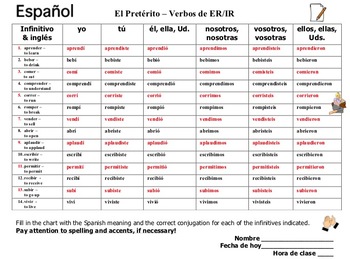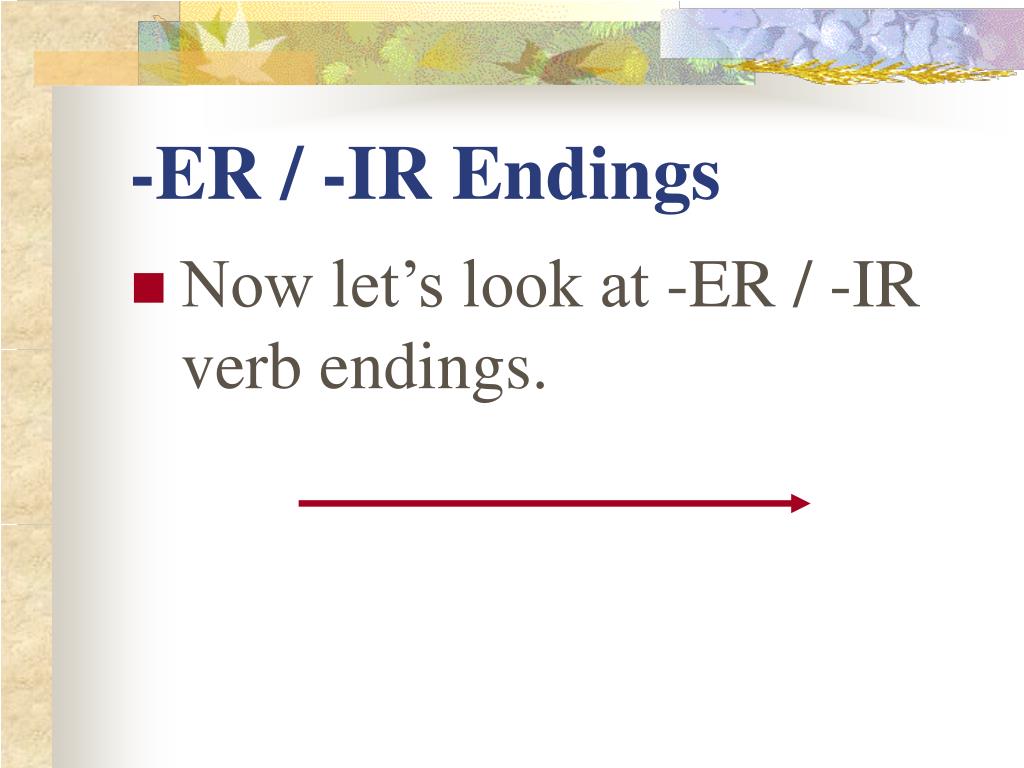
Verbs with Irregular Preterite Endings and Changes in the StemĪll the verbs in this group have different preterite endings and no accent marks. Here is a -uir verb with no accent over the i: Preterite Conjugation for – uir Verbs: huir (to run away, to flee) SIngular These were only two boys and they corroded the whole group. Preterite Conjugation for – oer Verbs: corroer (to corrode) SIngularįueron dos chicos nada más y corroyeron todo el grupo. Preterite Conjugation for – oír Verbs: oír (to hear) SIngular Haha! You fell for it! And this was all a joke. ¡Jaja! !Caíste! Y todo esto fue una broma. Preterite Conjugation for – caer Verbs: caer (to fall) SIngular Preterite Conjugation for – eer Verbs: creer (to believe) SIngular

The letter z changes to c for the same reasons as for the verbs above. Preterite Conjugation for Verbs Ending in -zar: organizar (to organize) You have to add the letter u after the letter g to keep the original pronunciation. Last year, I touched a dolphin! Preterite Conjugation for Verbs Ending in -gar: pagar (to pay) The letter c changes to qu for pronunciation reasons, if it didn’t you would pronounce the word * tocé as /to’se/ instead of /to‘ke/. Preterite Conjugation for Verbs Ending in -car: tocar (to touch) Three types of verbs have an irregular stem in the first person but they keep the regular preterite endings: They didn’t smile when they saw me! Preterite Verbs That Change in the Yo Form Preterite Conjugation with Accent Changes: sonreír (to smile) SIngular Preterite Conjugation for e to i Stem Changes: sentir (to feel) SIngular On this list of 50 irregular Spanish verbs, there are five verbs with the e to i change, two verbs with the o to u change, and two verbs with accent changes. These changes occur ONLY in the third-person singular and the second- and third-person plural. The – ir irregular preterite verbs that keep the regular – ir endings involve three types of changes: For example, for the verb comer (to eat), the stem is com. Just a quick reminder a stem is what you get when you cut off the infinitive ending (–ar, -er, -ir) from the verb. The following irregular preterite verbs keep the regular endings but suffer some other changes inside the stem. abrir (to open): abrí, abriste, abrió, abrimos, abrieron.correr (to run): corrí, corriste, corrió, corrimos, corrieron.

Preterite Endings: Regular -er and -ir Verbs These are the regular endings for each conjugation: Preterite Endings: Regular -ar Verbsįor example: hablar (to talk) – hablé, hablaste, habló, hablamos, hablaron, hablaron. Verbs with Regular Preterite Endings and Minor Stem Changes We can divide the irregular preterite Spanish verbs into three groups: 1.
#PRETERITE ENDINGS IR HOW TO#
In a moment, you’ll learn how to conjugate them all! Irregular Preterite Spanish Verb Categories

#PRETERITE ENDINGS IR PDF#
Click here to download this list in a PDF format to practice with the verbs later on. This is simply a list of all of them in alphabetical order later you’ll learn more about them. Let’s start with the list of the 50 irregular preterite verbs that you’ll learn to use and conjugate today. Easy Guide To Spanish Irregular Verb Conjugation.18 Preterite Trigger Words in Spanish for Conversations in Past Tense.Preterite vs Imperfect: A Beginner’s Guide to the Past Tense in Spanish.


 0 kommentar(er)
0 kommentar(er)
